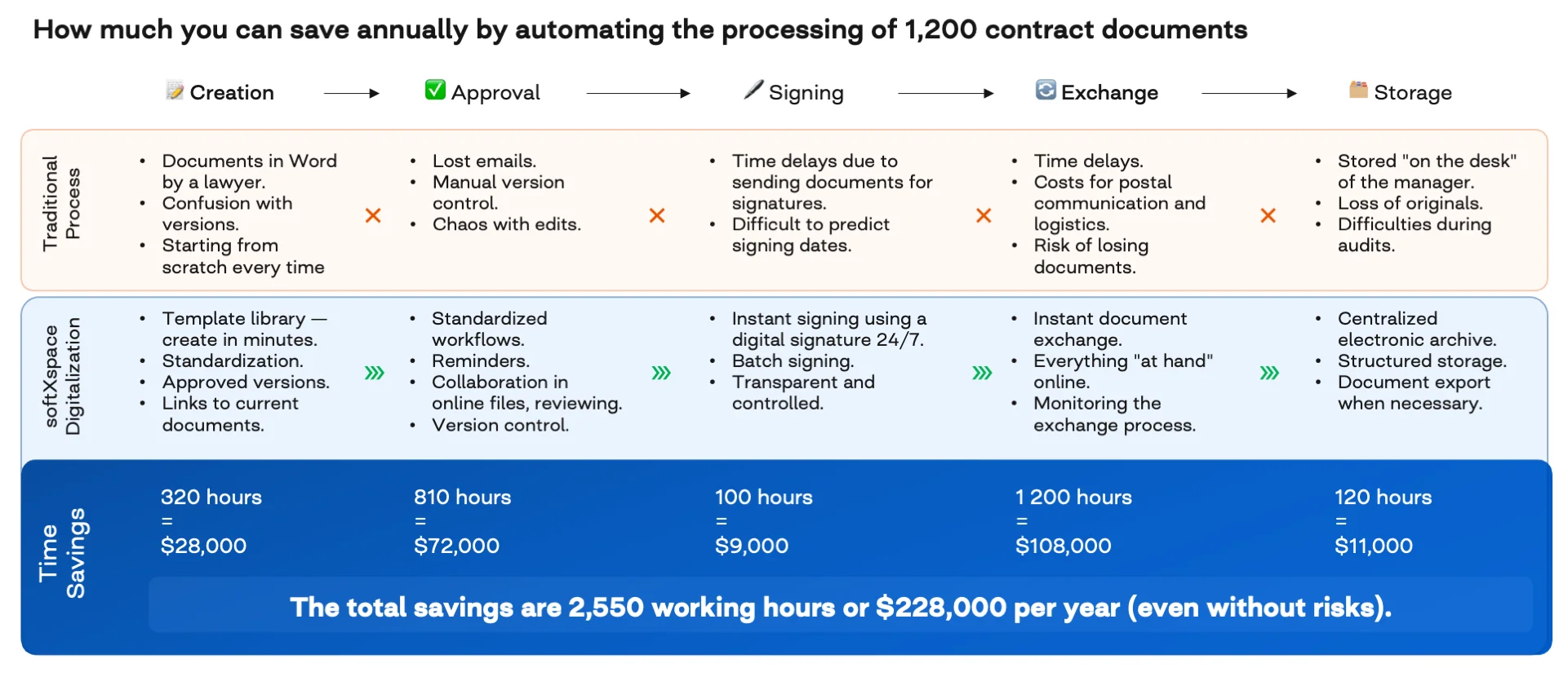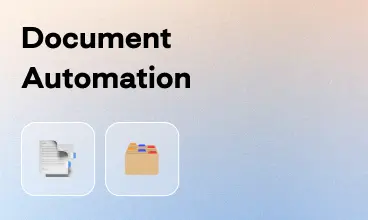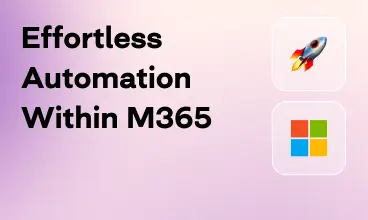Managing contracts manually is a painstaking, error-prone, and expensive process that is detrimental to efficiency and compliance. With the most advanced technology, the Contract Management Automation System revolutionizes this process by automating the contract lifecycle, from creation to storage. It eliminates errors, speeds approvals, improves collaboration, and provides complete process visibility.
In this article, we’ll cover the benefits, core features, and real-world applications of contract automation systems and why they are critical to modern businesses seeking efficiency and cost savings.
What is a Contract Management Automation System?
A contract management automation system is a state-of-the-art solution that will help streamline and improve the whole lifecycle of a contract from creation to execution and storage. This system uses workflow automation to automate repetitive tasks, reduce errors, and maintain consistency in dealing with contracts.
Contract automation allows businesses to automate the entire contract management lifecycle to simplify the process, covering all key stages: generation, negotiation, signing, execution, renewal, and analysis. It makes key drafting features, such as clause libraries, automated templates, digital signatures, collaboration tools, and workflows to draft compliant contracts, approve more quickly, and ensure legal enforceability.
All contracts' storage is centralized, secure, and easy to access. Data integration supports this by allowing seamless use with other platforms like CRMs and ERPs and maintaining accurate and up-to-date information in all systems.
Why Businesses Need Contract Management System
Contract management is vital for a business's efficiency and for avoiding risks. However, many organizations struggle in this area. According to a World Commerce and Contracting study, poor contract management can cost businesses 9% of their annual revenue.
Common Pain Points in Contract Management:
Managing High Volumes of Contracts: A large volume of simple contracts means 89% of businesses have to handle large volumes of simple contracts, which results in repetitive administrative burdens.
Tracking Contract Progress: When contracts lack a centralized system, status monitoring is difficult and delays and missed deadlines are unavoidable.
Ensuring Compliance: However, manual processes mean that it is not easy to ensure that all contracts follow company policies and regulatory requirements and that risk increases.
A Contract Management System is a solution for these issues by automating and streamlining the contract lifecycle. Typical features of the system are workflow automation, agreement management, centralized storage, data integration, clause libraries, and digital signatures. These tools improve efficiency, eliminate errors, and meet compliance.
The automation for the exchange of hundreds of contractual documents with counterparties is crucial to speed up business operations. Contracts, invoices, purchase orders, sales orders, delivery receipts, change orders, amendments, payment schedules, NDAs, and statements of work (SOW) are all included. These are documents exchanged with counterparties and automating both the internal process as well as the exchange of such documents improving efficiency, minimizing errors, and ensuring timely communication within the business workflow.
According to our data, an average company generates approximately 1,200 contractual documents annually and contract management automation can cut administrative costs by approximately 228 000$ per year, and save work time by 2 550 work hours. When adopting a contract management system, businesses can overcome their common pain points, secure revenue, and boost the performance of the whole operation.

How Contract Automation Improves Business Efficiency
Contract automation is a transformative solution for businesses that have the potential to make the complex workflow process easy to manage. Organizations can eliminate inefficiencies, reduce errors, and save time for higher-value work by automating the entire contract lifecycle. Here’s how contract automation drives efficiency and saves resources for a company managing 1,200 contracts annually:
Streamlined Contract Creation
Manual contract creation is typically a repetitive, confusing, and back-and-forth revision process that can slow down contract delivery. Using tools, such as clause libraries, prebuilt templates, and document generation automation, businesses can eliminate these problems, reducing the time needed from hours to minutes. A business that handles 1,200 contracts annually can save 28,000$ and 320 work hours, which can save a lot of time and resources, hundreds of hours of work, and consistency in all documents.
Accelerated Approvals
Bottlenecking the approval process can also lead to delays in the approval process, which may derail the company’s revenue and customer satisfaction. Workflow automation means that contracts are automatically routed to the right stakeholders, with real-time notifications and standardized approval steps, and 810 hours savings per year. It is not only a faster turnaround but also reduces errors associated with approval. Automation saves businesses hundreds of hours annually, saving them tens of thousands of dollars in efficiency gains.
Simplified Signing Processes
The days of signing and mailing contracts are wasting time procedure. With digital signatures, the contracts can be signed 24/7, and save 9 work hours with approximately 9,000$ per year. It eliminates bureaucratic delays as well as ensures compliance with the standards in approval. This means saving time for organizations managing high volumes of contracts and the associated costs of traditional signing methods.
Document Exchange and Collaboration
This is where exchanging and working on documents manually causes versioning problems and miscommunication. Automation allows documents to flow smoothly among people and counterparties in a secure online environment without collaboration. Not only does this speed up the workflow, but it also reduces the risk of lost or misplaced documents for businesses, saving them lots of time and effort.
Centralized and with Easy Retrieval
It means that contracts are always secure, organized, and available. Businesses can use automated systems to get documents instantly, keep track of deadlines, and keep a structured archive. It reduces the risks of losing important agreements and of failing audits or reviews.
Contract Automation: Real Results
Automation can save 1,200 contract workflows worth 2,550 hours of employee time and up to $228,000 in costs for businesses managing 1,200 contract workflows annually. The savings come from more efficient creation, faster approvals, and streamlined signing and storage processes.
Organizations using contract automation improve operational efficiency and collaboration, accuracy, and compliance. This shift enables businesses to be strategic while allowing routine processes to be in the hands of technology.
Core Components of Contract Automation
A robust set of features of contract automation enables us to automate the entire contract lifecycle with increased efficiency, accuracy, and compliance. Below are the core components that define an effective contract automation system:
Document Generation and Templates
Pre-approved templates help automate the process of creating documents save time and keep them consistent. Quick customization is possible with templates, while still ensuring compliance with company policies, and legal standards and reducing the opportunity for repetitive tasks and errors.
Digital Signature
Instant contract signing means no more delays with physical paperwork and secure and legally binding digital signatures. Compliance with regulations is ensured by this feature and gives a seamless and secure signing experience.
Document Storage
All contracts are stored in centralized storage, and they provide secure and organized access. An advanced search capability allows businesses to find necessary documents quickly, monitor their status, and make sure that they’re in compliance with the retention policy, reducing the likelihood of losing or misplaced contracts.
Lifecycle automation
Bottlenecks are removed by automating the entire contract lifecycle from creation to renewal. Thanks to workflows, contracts glide through pre-defined steps like approval, negotiations, and execution, often speeding up the process and reducing delays.
Collaborations with Counterparties
Businesses can work with external partners in an efficient way using simplified collaboration tools. In a secure environment, counterparties can review, comment on, and access contracts without the chaos of back-and-forth emails.
Document Analytics
Real-time analytics offer the business valuable insights into contract performance and trends. Contract management businesses can track turnaround times, compliance rates, and renewal cycles to identify opportunities for improvement and optimize contract management strategies.
Obligations Controlling
Contractual obligations need to be tracked to avoid risk and penalty. Automation keeps you on track by sending out reminders and notifications of all key deadlines, such as renewals or deliverables so that businesses can honor commitments and remain top of mind with stakeholders.
Adaptability to Business Needs
The process is a flexible, Low-code/No-code approach that allows users to easily design tailored processes to each document type, adjust forms, and change templates without coding skills. This gives the system the ability to react quickly to changing business requirements, and without wasting time and resources. Making these changes quickly and easily increases operational flexibility, keeping the system in tune with the special requirements of each organization.
Contract automation enriches the business with the efficiency, collaboration accuracy, and security of their contract processes by incorporating these core components.
Case Study: The Impact of Contract Automation
Kernel
For over 8 years, Kernel, a leader in the agricultural sector, has been able to leverage contract automation. Kernel processes over 100,000 electronic documents per year through the automation of contract document management and interactions with counterparties. The company has integrations with a variety of internal and external systems, such as ERP, CRM, BI, etc. The implementation of a B2B portal for collaboration with counterparties, including suppliers, clients, and partners, simplifies interactions with over 6,500 counterparties. It significantly speeds up and improves the accuracy and reliability of document workflows.
Novus
A well-known retail chain Novus implemented automation systems into its contract management processes. Through the implementation of contract management software based on the softXspace platform and integration with trusted EDI platforms, Novus made processes easier and faster, reduced manual errors, and decreased approval times. Therefore, the company improved its operations, allowing departments and counterparties to work faster together, and improving productivity and compliance across the board.
Risoil S.A.
One of the main players in the logistics and agribusiness sectors, Risoil S.A. used contract automation to automate its document management processes. Through the adoption of advanced electronic document workflows and the embedding of YouControl, Risoil S.A. became much more transparent and compliant. With this automation based on softXspace365 for M365, the company was able to process contracts smoothly while it collaborated with its stakeholders, and also improve operational excellence.
Nibulon
In just 2 years after implementing contract automation, Nibulon, a major Ukrainian grain producer and exporter, has achieved outstanding results. Today, Nibulon processes over 180,000 electronic documents annually through automating document workflows and interactions with counterparties. The company had streamlined its operations, with 3,500+ counterparties, eliminating delays and increasing contract execution accuracy. Thanks to the Low-Code/No-Code capabilities of the contract management software, the implementation process was completed in just two months and continues to evolve without the need for coding.
NDA
Contract automation has been used by global agricultural products leaders for over 4 years to optimize operations. The company processes more than 31,000 electronic documents annually and has robust CLM software that makes accuracy and reliability better. The company seamlessly integrates with the B2B portal based on softXspace. ClientPortal, allowing it to work effectively with 650+ counterparties. The company has automated document workflows, reducing administrative workloads, reducing errors, and improving communication throughout its operations.
How to Choose the Right Contract Management Automation System
Picking the best Contract Management Automation System is vital to making your contract processes easier and more efficient. To ensure you choose a solution that aligns with your organization’s needs, consider the following key factors:
1. Ease of Use and Flexibility
You want a system with an easy-to-use interface that doesn’t take a lot of training for employees. An ideal solution should give you the freedom to customize according to your own sets of workflows and business processes.
2. Contract Lifecycle Management from End to End
The system should run from contract generation and approval workflows through to execution, storage, and renewal tracking. The whole process is automated from the start to the finish.
3. Built-in Templates and Clause Libraries
Templates and clause libraries make it easy and fast to create contracts, and this makes walls (a.k.a. errors) difficult to build. The system should also support the thing of storing the pre-approved clauses for the sake of compliance as well as efficiency.
4. Integration Capabilities
Find a platform that seamlessly works with your current tools: CRM, ERP, document management (DMS), DWH, CSP, state registers, etc. Data integration eliminates manual entry and eliminates errors across platforms.
5. Digital Signature Support
Contract signing should be secured and legally compliant, so digital signatures should be part of a robust solution. With these, approvals are accelerated and the delays of signatures are eliminated.
6. Storage and Security
All contracts are stored securely in centralized storage and are easy to access. Check for security features like role-based permission, encryption, and compliance with regulatory standards.
7. Analytics and Reporting
Contract analytics tools give you visibility into contract performance with visibility into KPIs, bottlenecks, and renewal timelines. Data-driven decision-making comes from insightful reporting.
8. Scalability and Support
The system should grow with your business so that it can handle increasing contract volumes and complexity as your business grows. Check if the provider provides good customer support, and if they provide regular updates.
With these factors in mind, you can select a Contract Management Automation System that not only helps to improve your business efficiency but also provides better compliance, security, and collaboration in all the contract processes.
Introducing soft Xpansion Solution for Contract Automation
soft Xpansion offers a complete contract automation solution that combines internal contract management software with a B2B Client Portal that simplifies workflows and optimizes document and data exchange with counterparties. We offer a contract management system based on Low-Code/No-Code platform softXspace and a ready-made application for Microsoft 365. These features like employee accounts, registries, templates, collaboration, secure digital signatures, workflows, storage, and Low-Code adaptation make it easy for businesses to manage contracts, ensure compliance, and reduce manual effort.
The Client Portal integrated solution brings the counterparties into one window for activities, such as accreditation, document exchange, approvals, signing, etc. It accelerates collaboration and minimizes delay by providing tools such as checklists, ready-made templates, and automated notifications.
The solution also handles important processes including legal document exchange, procurement workflows, and company news and price list updates. soft Xpansion is backed by powerful integrations with ERP, ECM, CRM, and other systems to provide a connected and efficient contract lifecycle.
Conclusion
A Contract Management Automation System automates the entire contract life cycle, saving time, eliminating errors, and improving compliance. Businesses can save time, improve collaboration, and gain complete control over contracts by automating workflows, approvals, and storage.
Soft Xpansion will transform your contract management, contact us today for a personalized consultation and start the process of smarter, more efficient processes!
FAQ
1. What is a Contract Management Automation System?
The Contract Management Automation System is software that automates the entire contract lifecycle from creation to execution and storage. It does contract generation, approvals, and workflow automation which saves time, reduces error, and increases compliance.
2. What is Contract Automation and how does it help your business become more efficient?
Contract automation speeds up processes by automating repetitive tasks such as creating contracts, using clause libraries and pre-approved templates. With digital signatures and data integration, approvals are made quickly and data transfer is seamless, decreasing impediments and increasing operational efficiency.
3. Why should centralized storage be used in contract management?
All contracts are stored securely in one place and are easy to search, retrieve, and manage thanks to centralized storage. It guarantees version control, retention policy compliance, and speedy contract analysis and management.
4. Workflow Automation in a Contract Management System works in what ways?
Contract approval and execution are automated by routing documents to the right stakeholders according to predefined rules. It removes bottlenecks, sends automated notifications for pending tasks, and makes sure contracts move smoothly through each stage.
5. What are the importance of clause libraries and digital signatures in contract management?
Pre-approved terms and conditions are the hallmarks of clause libraries, even across different contracts. Digital signatures are legally binding signatures that provide secure, safe, and speedy approvals without the need for manual paperwork.





